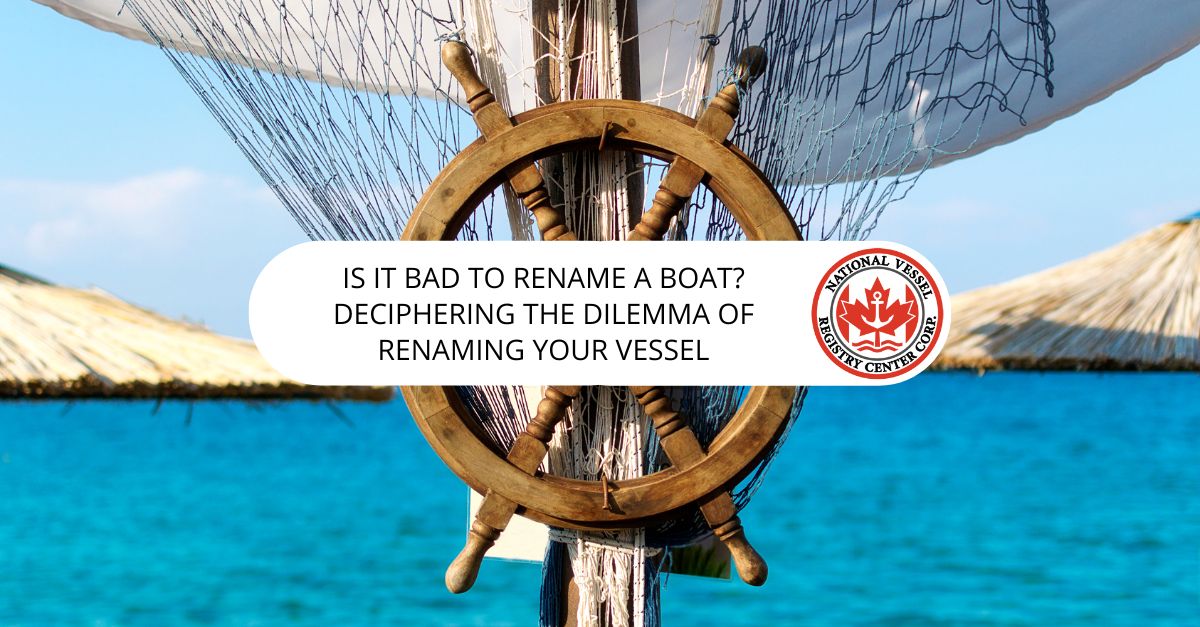Renaming a boat is a decision that can stir the waters of tradition and modernity, leaving many boat owners navigating through a sea of doubts. The question “Is it bad to rename a boat?” has divided the community into two camps: the more traditionalists who adhere to age-old superstitions and the modern-day pragmatists who view a vessel as a mere object, devoid of mythical consequences.
This article will dive into this maritime situation, investigating the depths of nautical lore as well as the currents of modern practice, in order to provide clarity to those considering renaming their cherished vessel.
Historical Superstitions
The ocean is a world on its own, filled with mysteries and superstitions, and the act of renaming a boat has a strong connection in maritime folklore. Historically, sailors believed that once a boat was named, its identity became known to the gods of the seas, particularly Poseidon, the ruler of the ocean depths. To change a boat’s name was to tempt the wrath of these divine forces, inviting bad luck and misfortune upon the vessel and its crew. This belief was so deeply established that elaborate ceremonies were created to appease the sea gods and cleanse the boat of its former identity, ensuring safe passage under its new name.
Modern Perspectives on the Question of Is it Bad to Rename a Boat?
As we sail into the 21st century, the concept of renaming a boat now “sails” through more pragmatic waters. Advances in technology and shifts in societal beliefs have somewhat diluted the power of old superstitions, allowing for a more rational approach to boat renaming. Many seasoned sailors and marine authorities now argue that a boat’s name can be changed without fear, provided that the new name resonates with the owner and the vessel itself. Personal connection and the practical advantages of boat ownership have taken precedence over devotion to traditional maritime legend.
The Renaming Ritual
Despite the shift towards practicality, the tradition of performing a renaming ceremony continues, blending old tradition with new interpretations. The essence of the ceremony involves symbolically erasing the boat’s old name from the records of the sea gods and welcoming its new identity with offerings and celebrations.
This can range from the simple pouring of champagne over the bow to larger gatherings involving friends and family. Modern variants often incorporate elements of the boat owner’s personal history and aspirations, infusing the ritual with a sense of continuity and rebirth.
Embracing New Traditions
In this era where the old and new converge, boat owners are crafting their own renaming rituals that reflect personal beliefs and contemporary values. This fresh take on an ancient practice allows for a more inclusive and diverse celebration of a boat’s new identity, inviting not just the gods of the sea but also the community of fellow boaters to witness and partake in this significant milestone. It’s a beautiful blend of respecting tradition while also embracing the individuality and spirit of modern boating culture aimed at trying to answer the questions of is it bad to rename a boat?
Legal and Practical Considerations
Beyond the world of tradition lies the practical aspect of renaming a boat, which involves a series of legal steps to ensure that the vessel’s new identity is recognized and compliant with maritime laws. This includes updating the boat’s registration documents, insurance policies, and any other official paperwork that bears its name. The National Vessel Registry Center plays a crucial role in this process, offering streamlined services to facilitate the updating of documentation. With easy access to necessary forms and a secure platform for submission, boat owners can confidently navigate the administrative side of renaming their vessel.
Where Can I Get Forms For Documentation?
For those wondering where to find the forms required for all forms boat documentation, the answer is straightforward. The National Vessel Registry Center’s online portal offers a comprehensive database of forms needed to submit documentation to Transport Canada.
From registration updates to transfers of ownership and bill of sale templates, all the paperwork can be completed online, removing the need to physically mail documents or visit offices. This convenient and safe approach ensures that the process of renaming a boat, among other documentation tasks, is as smooth as sailing on calm waters.

Setting Sail with Tradition and Compliance
Renaming a boat is a journey that intertwines the mystical with the ordinary, blending the rich tapestry of maritime tradition with the clear course of legal compliance. While the question “Is it bad to rename a boat?” may never be definitively answered, what remains clear is that the process, when navigated with respect for both tradition and modern regulations, can be a fulfilling journey.
By embracing the rituals of the past and using the resources of today, such as the National Vessel Registry Center’s online portal, boat owners can set sail under a new banner with confidence and peace of mind. Whether you’re drawn to the charm of nautical lore or guided by the compass of practicality, the decision to rename your vessel is a personal voyage, charted with the knowledge that the sea respects both the reverence of tradition and the charters of legality.

